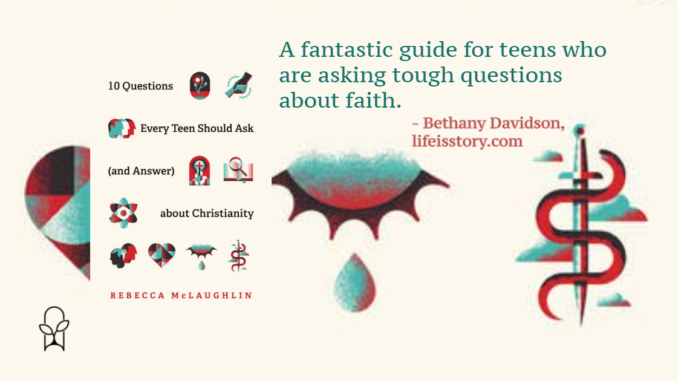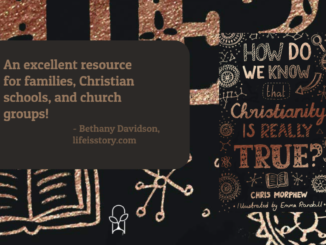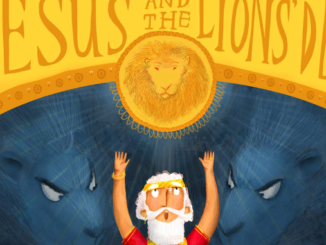
Also by this author: World on Fire: Walking in the Wisdom of Christ When Everyone’s Fighting About Everything, Is Christmas Unbelievable?: Four Questions Everyone Should Ask about the World's Most Famous Story, Confronting Jesus: 9 Encounters with the Hero of the Gospels, Is Easter Unbelievable?: Four Questions Everyone Should Ask about the Resurrection Story, Is Easter Unbelievable?: Four Questions Everyone Should Ask about the Resurrection Story, No Greater Love: A Biblical Vision for Friendship
Published by Crossway Books on March 16, 2021
Genres: Non-Fiction, Apologetics, Christian Life
Buy on Amazon
Goodreads

Written by Rebecca McLaughlin, Author of Confronting Christianity
In a world of increasing ideological diversity, kids are being challenged to think through their own beliefs at an early age. Questions like How can you believe the Bible is true?; Why can't we just agree that love is love?; and Isn't Christianity against diversity? can seem like roadblocks for kids who are following Jesus, as well as for those who might otherwise consider faith in Christ. In this helpful book--written both for Christian kids and for those who think Jesus is just a fairy tale character--Rebecca McLaughlin invites readers ages 12-15 to dig deep into hard questions for themselves and perhaps discover that the things that once looked like roadblocks to faith might actually be signposts.
When I was a teenager, I always felt suspicious of any book adapted for teens. Generally, authors watered down the original material, included stereotyped illustrations, and talked down to the reader, assuming that they would only keep reading if the writer kept their attention with a quirky tone, slang, and pop culture references. This book, however, epitomizes a teenage version done well. I would have loved this when I was the target age for it, and enjoyed reading it in addition to McLaughlin’s adult book. This isn’t just an abridged version of Confronting Christianity, but is an entirely rewritten work that is specifically geared towards teenagers, their developmental stages, their concerns, and the common questions that they have about Christianity.
Audience
In 10 Questions Every Teen Should Ask (and Answer) about Christianity, McLaughlin addresses the same common questions and objections that she responded to in her work for adults. However, she writes about them differently, with sensitivity to the thoughts and social contexts of today’s teenagers. She shares similar personal and real-life illustrations, and draws in much of the same cited material, but she changed, added, or removed elements based on what her audience would find most relevant and be intellectually or emotionally read for. In the introduction, she encourages readers who are sixteen or older to consider reading Confronting Christianity, and this book is for younger teens. She takes teens’ questions and concerns very seriously and talks to them as equals, but does so in a way that avoids extremely heavy or complex content that would turn off reluctant or highly sensitive readers.
Issues
In the first chapter, McLaughlin writes about the scientifically indicated benefits of the Christian life, showing how Christianity can impact people’s physical and mental health. After this, she writes about common objections to Christianity or questions about the faith. She addresses concerns about race, pluralism, the basis for morality, evidence for the gospels and the resurrection, reasons why science hasn’t disproved Christianity, issues about sexuality and gender, the problem of suffering, and beliefs about heaven and hell. She shares personal stories and testimonials from friends and associates throughout the book, showing how real people have navigated their questions about life and found meaningful, life-changing answers in the Christian faith.
I appreciate McLaughlin’s vulnerability and insight, and she writes to teens in a way that is engaging, compassionate, and personal. Also, even though she weaves in lots of pop culture references, none of them are studied attempts at coolness. She doesn’t try to act or talk like a teenager, but engages with familiar books and movies in a way that is totally natural and supports her writing. Her references to the Harry Potter stories include some significant spoilers, which she warns readers about up front, but she draws on stories and examples from Harry Potter and movies like Moana and Frozen to create vivid illustrations and examples that teens can relate to.
Conclusion
I would highly recommend this book to teenagers who are asking deep questions about Christianity. If they are skeptics, they will find McLaughlin thought-provoking and fair, and if they are Christians, they can deepen their faith by understanding the reasons behind what they believe. McLaughlin’s arguments, real-life examples, and cited sources can also help teens know how to respond to the objections and questions of people around them. A single book can’t cover everything, and some readers will have different areas of disagreement with the author, but this is a fantastic guide for teens who are asking tough questions about faith.



